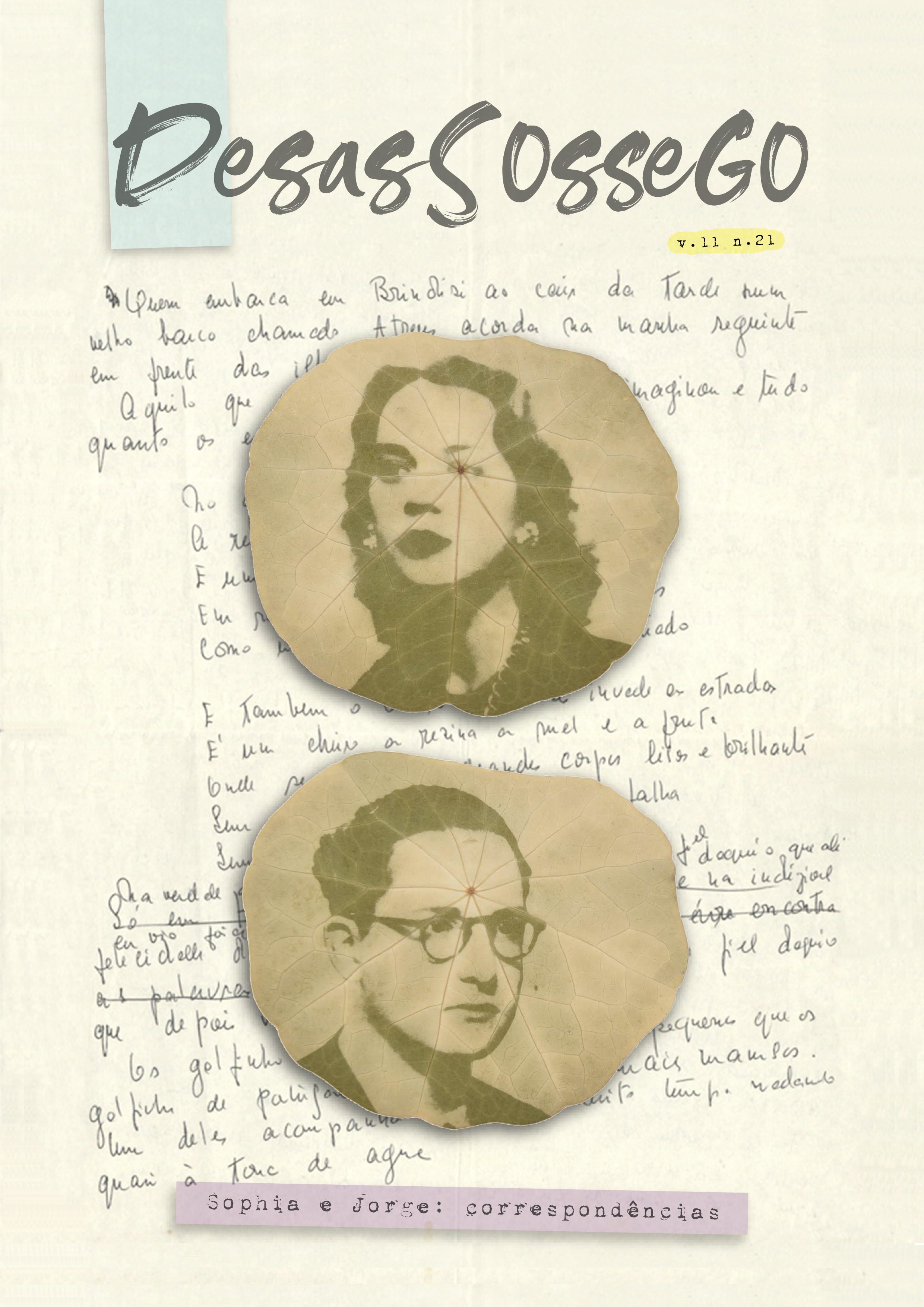"Atenta como uma antena"
a invocação à Musa e a poética da escuta de Sophia
DOI:
https://doi.org/10.11606/issn.2175-3180.v11i21p10-22Keywords:
Sophia de Mello Breyner Andresen, Inspiration, Invoking, ListeningAbstract
Sophia de Mello Breyner Andresen's “Poetic Art II”, like the other texts of the homonymous sequence, presents a theory and an interpretation of poetry that reveals, specially, a worldview. Speaking of poetry not only as an object on which to weave her considerations, Sophia transforms it into a subject of demands and requests directed to her, stating that “it is from the unrelenting obstinacy that poetry demands that the 'obstinate rigor' of the poem is born”. Two of the most important demands amongst those mentioned is the imperative of facing the “universe”, and being “attentive as an antenna” - a formulation that becomes a kind of motto of Sophia’s thinking. The idea that the poet must be attentive thus permeates her poetic work. The act of listening emerges not only as a “vibration with the outside”, but rather as something that comes from an urge or a desire to listen. As a fundamental condition for writing, this urge will take shape in some poems in terms of a request, a prayer, or, more specifically, an invocation to a Muse. Thus, we are presented to a moment before the listening act, and so emerges, in the list of the three Andresenian actions - listening, naming and making landscapes, as Silvina Rodrigues Lopes points out -, a fourth: invoking - that is, asking to listen. In this text, we investigate the relations between listening and invocation that appear in a poem like “Musa”, of Livro sexto (1962).
Downloads
References
ANDRESEN, Sophia de Mello Breyner; SENA, Jorge de. Correspondência 1959-1978. 3ª ed. Lisboa: Guerra e Paz, Col. Tempos Modernos, 2010.
ANDRESEN, Sophia de Mello Breyner. Obra poética. Edição de Carlos Mendes de Sousa. Lisboa: Caminho, 2010.
CAMÕES, Luís Vaz de. Os Lusíadas. Ed. org. por Emanuel Paulo Ramos. Porto: Porto editora, 2017.
GUSMÃO, Manuel. “Da evidência poética: justeza e justiça na poesia de Sophia”. Tatuagem e palimpsesto. Lisboa: Assírio & Alvim, 2010.
HESÍODO. Teogônia: a origem dos deuses. Edição revisada e acrescida do original grego. São Paulo: Iluminuras, 2015.
HOMERO. Ilíada. Trad. e introd. Carlos Alberto Nunes. 25ª ed. Rio de Janeiro: Nova Fronteira, 2015.
LOPES, Silvina Rodrigues. Exercícios de aproximação. Lisboa: Vendaval, 2003.
MARTELO, Rosa Maria. Imagens e som no mundo de Sophia. Sophia de Mello Breyner Andresen: Actas do colóquio internacional. Org. Maria Andresen Sousa Tavares e Centro Nacional de Cultura. Porto: Porto Editora, 2013, p. 35-45.
MARTINS, Fernando Cabral. “O nome poesia”. In: ANDRESEN, Sophia de Mello Breyner. O nome das coisas. Lisboa: Assírio & Alvim, 2015.
MURRAY, Penelope. “Invocation to the muses”. In: WINNIFRITH, Tom; MURRAY, Penelope (eds.). Greece old and new. London: The Macmillan Press, 1983.
PLATO. The Dialogs of Plato, Vol. 3: Ion, Hipias Minor, Laches, Protagoras. Translated and with comment by R. E. Allen. New Haven and London: Yale University Press, 1984.
RUBIM, Gustavo. “Para que as coisas se vejam”. In: ANDRESEN, Sophia de Mello Breyner. Livro sexto. Lisboa: Assírio & Alvim, 2014.
SOUSA, Carlos Mendes de. “Sophia e a dança do ser”. In: Sophia De Mello Breyner Andresen – Actas Do Colóquio Internacional. Org. Maria Andresen de Sousa Tavares/ Centro Nacional de Cultura. Porto: Porto Editora, 2013, p. 130-138.
Downloads
Published
Issue
Section
License
Copyright (c) 2019 Maria Silva Prado Lessa

This work is licensed under a Creative Commons Attribution-NonCommercial 4.0 International License.
O(s) autor(es) declara(m) automaticamente ao enviar um texto para publicação na revista Desassossego que o trabalho é de sua(s) autoria(s), assumindo total responsabilidade perante a lei nº 9.610, de 19 de fevereiro de 1998, no caso de plágio ou difamação, obrigando-se a responder pela originalidade do trabalho, inclusive por citações, transcrições, uso de nomes de pessoas e lugares, referências histórias e bibliográficas e tudo o mais que tiver sido incorporado ao seu texto, eximindo, desde já a equipe da Revista, bem como os organismos editoriais a ela vinculados de quaisquer prejuízos ou danos.
O(s) autor(s) permanece(m) sendo o(s) detentor(es) dos direitos autorais de seu(s) texto(s), mas autoriza(m) a equipe da Revista Desassossego a revisar, editar e publicar o texto, podendo esta sugerir alterações sempre que necessário.
O autor(s) declara(m) que sobre o seu texto não recai ônus de qualquer espécie, assim como a inexistência de contratos editoriais vigentes que impeçam sua publicação na Revista Desassossego, responsabilizando-se por reivindicações futuras e eventuais perdas e danos. Os originais enviados devem ser inéditos e não devem ser submetidos à outra(s) revista(s) durante o processo de avaliação.
Em casos de coautoria com respectivos orientadores e outros, faz-se necessária uma declaração do coautor autorizando a publicação do texto.
Entende-se, portanto, com o ato de submissão de qualquer material à Revista Desassossego, a plena concordância com estes termos e com as Normas para elaboração e submissão de trabalhos. O não cumprimento desses itens ou o não enquadramento às normas editoriais resultará na recusa do material.


